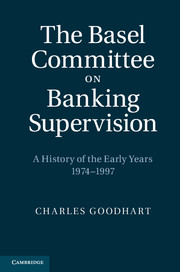Book contents
- Frontmatter
- Contents
- Figures
- Tables
- Foreword
- Preface
- 1 Introduction
- 2 The antecedents of the BCBS
- 3 Modus operandi
- 4 The Concordat
- 5 External and foreign exchange issues
- 6 Capital adequacy and the Basel Accord of 1988
- 7 The Market Risk Amendment
- 8 The Core Principles of Banking Supervision
- 9 Liquidity
- 10 Off-balance-sheet exposures and derivatives
- 11 Other topics addressed by the BCBS
- 12 The relationship of the BCBS with banks and other banking regulators
- 13 Relationships with other non-bank oversight and supervisory bodies
- 14 The legal position of the BCBS
- 15 The international relations of the BCBS
- 16 The BCBS and the social sciences
- 17 Epilogue
- Bibliography
- Index
8 - The Core Principles of Banking Supervision
Published online by Cambridge University Press: 07 September 2011
- Frontmatter
- Contents
- Figures
- Tables
- Foreword
- Preface
- 1 Introduction
- 2 The antecedents of the BCBS
- 3 Modus operandi
- 4 The Concordat
- 5 External and foreign exchange issues
- 6 Capital adequacy and the Basel Accord of 1988
- 7 The Market Risk Amendment
- 8 The Core Principles of Banking Supervision
- 9 Liquidity
- 10 Off-balance-sheet exposures and derivatives
- 11 Other topics addressed by the BCBS
- 12 The relationship of the BCBS with banks and other banking regulators
- 13 Relationships with other non-bank oversight and supervisory bodies
- 14 The legal position of the BCBS
- 15 The international relations of the BCBS
- 16 The BCBS and the social sciences
- 17 Epilogue
- Bibliography
- Index
Summary
The first set of BCBS Principles, on money laundering
The penchant for compiling principles, codes or standards of conduct for almost every, and any, variety of human behaviour imaginable was mainly a creature of the 1990s. It began, however, in the field of banking in the late 1980s in the guise of a code of conduct for the prevention of money laundering (or AML – anti-money laundering, as it became known). Prior to 2001 this aimed at restricting the drug trade rather than terrorism. The Americans took the lead in the ‘wars’ against both drugs and terror; they were keen that foreign/international banks should not be used to launder drug money. So a note by the Federal Reserve Board proposing an AML Code of Conduct was submitted to the BCBS in June 1987 (BS/87/49).
Comments were received from Switzerland (BS/87/51) (which was considering making money laundering a criminal offence), Canada, France and the Netherlands which were broadly in favour of such a code of conduct; from Luxembourg and Belgium, which, while supporting the aims of the exercise, thought that the BCBS was not the proper forum for it; from Germany, which was opposed to approaching banks so long as legal distinctions between criminal and civil laws remained to be resolved; and from both the Bank of England and the British Bankers Association (BBA), which were quite hostile (BS/87/74). The Banca d’Italia response (BS/88/9) was also lukewarm.
- Type
- Chapter
- Information
- The Basel Committee on Banking SupervisionA History of the Early Years 1974–1997, pp. 286 - 316Publisher: Cambridge University PressPrint publication year: 2011
- 9
- Cited by



